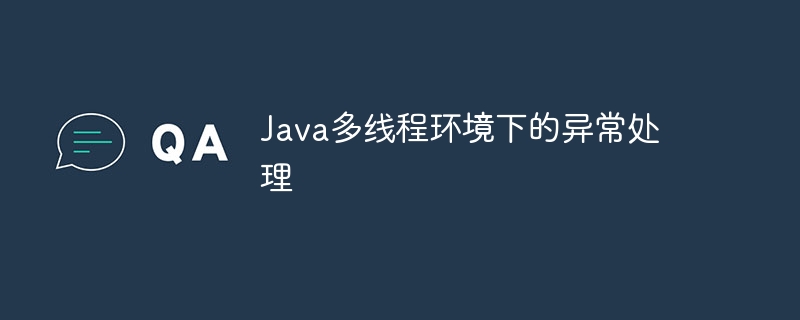Exception handling in Java multi-threaded environment
May 01, 2024 pm 06:45 PMKey points of exception handling in a multi-threaded environment: Catching exceptions: Each thread uses a try-catch block to catch exceptions. Handle exceptions: print error information or perform error handling logic in the catch block. Terminate the thread: When recovery is impossible, call Thread.stop() to terminate the thread. UncaughtExceptionHandler: To handle uncaught exceptions, you need to implement this interface and assign it to the thread. Practical case: exception handling in the thread pool, using UncaughtExceptionHandler to handle uncaught exceptions.

Exception handling in Java multi-threaded environment
The essence of multi-threaded programming is to execute multiple tasks concurrently, which is inevitable The land will encounter unusual circumstances. Handling exceptions in a multi-threaded environment is very different from a single-threaded environment and requires special attention.
Handling thread exceptions
In a multi-threaded environment, each thread has its own execution stack and local variables, so exceptions thrown by one thread will not affect other threads. To handle thread exceptions, you can use the following steps:
- In each thread's code, use a
try-catchblock to catch exceptions. - In the
catchblock, print error information or perform other error handling logic. - If the thread cannot recover from the exception, you can call the
Thread.stop()method to terminate the thread.
Sample code:
public class ThreadExceptionHandler implements Runnable {
public void run() {
try {
// 执行可能抛出异常的代码
} catch (Exception e) {
System.out.println("Caught exception in thread: " + Thread.currentThread().getName());
e.printStackTrace();
// 执行错误处理逻辑
}
}
}
public class Main {
public static void main(String[] args) {
Thread thread1 = new Thread(new ThreadExceptionHandler());
Thread thread2 = new Thread(new ThreadExceptionHandler());
thread1.start();
thread2.start();
}
}UncaughtExceptionHandler
Except try-catch block , Java also provides the UncaughtExceptionHandler interface to handle uncaught exceptions. When a thread throws an exception and there is no try-catch block to catch it, UncaughtExceptionHandler will be called.
To use UncaughtExceptionHandler, you need to perform the following steps:
- Implement the
UncaughtExceptionHandlerinterface. - Assign a custom exception handler to each thread.
- In the
uncaughtException()method, you can print error information or perform other error handling logic.
Practical case
A common practical case is to handle exceptions in the thread pool. Thread pool is a mechanism for managing threads, which can automatically create and destroy threads. When a thread in a thread pool throws an exception, UncaughtExceptionHandler will be used to handle the exception.
Sample code:
import java.util.concurrent.ExecutorService;
import java.util.concurrent.Executors;
public class ThreadPoolExceptionHandler implements UncaughtExceptionHandler {
public void uncaughtException(Thread t, Throwable e) {
System.out.println("Caught uncaught exception in thread: " + t.getName());
e.printStackTrace();
}
}
public class Main {
public static void main(String[] args) {
ExecutorService executorService = Executors.newFixedThreadPool(10);
executorService.setUncaughtExceptionHandler(new ThreadPoolExceptionHandler());
// 提交许多任务到线程池
executorService.shutdown();
}
}The above is the detailed content of Exception handling in Java multi-threaded environment. For more information, please follow other related articles on the PHP Chinese website!

Hot Article

Hot tools Tags

Hot Article

Hot Article Tags

Notepad++7.3.1
Easy-to-use and free code editor

SublimeText3 Chinese version
Chinese version, very easy to use

Zend Studio 13.0.1
Powerful PHP integrated development environment

Dreamweaver CS6
Visual web development tools

SublimeText3 Mac version
God-level code editing software (SublimeText3)

Hot Topics
 C++ function exceptions and multithreading: error handling in concurrent environments
May 04, 2024 pm 04:42 PM
C++ function exceptions and multithreading: error handling in concurrent environments
May 04, 2024 pm 04:42 PM
C++ function exceptions and multithreading: error handling in concurrent environments
 How does C++ exception handling support custom error handling routines?
Jun 05, 2024 pm 12:13 PM
How does C++ exception handling support custom error handling routines?
Jun 05, 2024 pm 12:13 PM
How does C++ exception handling support custom error handling routines?
 What is the relationship between recursive calls and exception handling in Java functions?
May 03, 2024 pm 06:12 PM
What is the relationship between recursive calls and exception handling in Java functions?
May 03, 2024 pm 06:12 PM
What is the relationship between recursive calls and exception handling in Java functions?
 Exception handling in C++ technology: How to handle exceptions correctly in a multi-threaded environment?
May 09, 2024 pm 12:36 PM
Exception handling in C++ technology: How to handle exceptions correctly in a multi-threaded environment?
May 09, 2024 pm 12:36 PM
Exception handling in C++ technology: How to handle exceptions correctly in a multi-threaded environment?
 Exception handling in Java multi-threaded environment
May 01, 2024 pm 06:45 PM
Exception handling in Java multi-threaded environment
May 01, 2024 pm 06:45 PM
Exception handling in Java multi-threaded environment
 How to handle exceptions in C++ Lambda expressions?
Jun 03, 2024 pm 03:01 PM
How to handle exceptions in C++ Lambda expressions?
Jun 03, 2024 pm 03:01 PM
How to handle exceptions in C++ Lambda expressions?
 PHP exception handling: understand system behavior through exception tracking
Jun 05, 2024 pm 07:57 PM
PHP exception handling: understand system behavior through exception tracking
Jun 05, 2024 pm 07:57 PM
PHP exception handling: understand system behavior through exception tracking
 How to handle cross-thread C++ exceptions?
Jun 06, 2024 am 10:44 AM
How to handle cross-thread C++ exceptions?
Jun 06, 2024 am 10:44 AM
How to handle cross-thread C++ exceptions?







